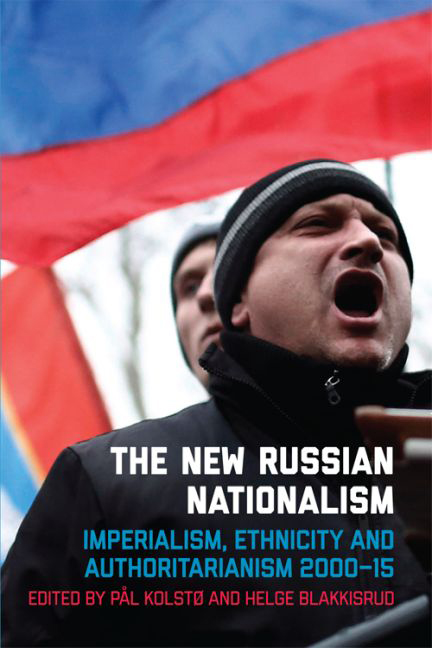Book contents
- Frontmatter
- Contents
- List of Figures
- List of Tables
- Acknowledgements
- Notes on Contributors
- Introduction: Russian nationalism is back – but precisely what does that mean?
- 1 The ethnification of Russian nationalism
- 2 The imperial syndrome and its influence on Russian nationalism
- 3 Radical nationalists from the start of Medvedev's presidency to the war in Donbas: True till death?
- 4 Russian ethnic nationalism and religion today
- 5 Everyday nationalism in Russia in European context: Moscow residents’ perceptions of ethnic minority migrants and migration
- 6 Backing the USSR 2.0: Russia's ethnic minorities and expansionist ethnic Russian nationalism
- 7 Rallying ’round the leader more than the flag: Changes in Russian nationalist public opinion 2013–14
- 8 How nationalism and machine politics mix in Russia
- 9 Blurring the boundary between civic and ethnic: The Kremlin's new approach to national identity under Putin's third term
- 10 Russia as an anti-liberal European civilisation
- 11 Ethnicity and nationhood on Russian state-aligned television: Contextualising geopolitical crisis
- 12 The place of economics in Russian national identity debates
- Bibliography
- Index
6 - Backing the USSR 2.0: Russia's ethnic minorities and expansionist ethnic Russian nationalism
- Frontmatter
- Contents
- List of Figures
- List of Tables
- Acknowledgements
- Notes on Contributors
- Introduction: Russian nationalism is back – but precisely what does that mean?
- 1 The ethnification of Russian nationalism
- 2 The imperial syndrome and its influence on Russian nationalism
- 3 Radical nationalists from the start of Medvedev's presidency to the war in Donbas: True till death?
- 4 Russian ethnic nationalism and religion today
- 5 Everyday nationalism in Russia in European context: Moscow residents’ perceptions of ethnic minority migrants and migration
- 6 Backing the USSR 2.0: Russia's ethnic minorities and expansionist ethnic Russian nationalism
- 7 Rallying ’round the leader more than the flag: Changes in Russian nationalist public opinion 2013–14
- 8 How nationalism and machine politics mix in Russia
- 9 Blurring the boundary between civic and ethnic: The Kremlin's new approach to national identity under Putin's third term
- 10 Russia as an anti-liberal European civilisation
- 11 Ethnicity and nationhood on Russian state-aligned television: Contextualising geopolitical crisis
- 12 The place of economics in Russian national identity debates
- Bibliography
- Index
Summary
Rossiiane. It was a word that Eltsin had trouble pronouncing, particularly after indulging in inebriating festivities, yet he clung doggedly to it in public statements, to reassure the ethnic minorities they belonged in the Russian state just as much as the majority ethnic Russians (russkie) did. Putin enunciated the word clearly and smoothly after arriving in the Kremlin in late 1999. But in March 2014, the month Russia annexed Crimea from Ukraine, Putin switched over to russkie when addressing the joint session of Russia's two houses of parliament. Crimea was now ‘a primordial russkaia land’, its key port of Sevastopol – ‘a russkii city’ and Ukraine's capital Kyiv – ‘the mother of russkie cities’ (Putin 2014a). The annexation of Crimea was accomplished, Putin asserted, to defend the 1.5 million russkie there from the pro-EU protesters who had swept away Ukraine's Moscow-leaning government in February 2014. With the guards behind him sporting an updated version of the Imperial Russia regalia, Putin signed into law Crimea's annexation, signalling his resolve to expand Russia's territory and dominance in the former Soviet space under the banner of ethnic russkii nationalism (see Aridici 2014 for a review). Commenting on Putin's vision, his spokesman Dmitrii Peskov said: ‘Russia (Rossiia) is the country on which the Russian [russkii] world is based’ and Putin ‘is probably the main guarantor of the safety of the Russian [russkii] world’ (Coalson 2014).
Although Russia's militarised intervention in Ukraine thrust it into the media limelight, the conceptual shift to russkie had been institutionalised and promoted earlier, when Putin returned to the Kremlin in early 2012. In a programmatic newspaper article on national identity, Putin claimed that Russia was a unique multi-cultural civilisation. This civilisation was based, he argued, on centuries of coexistence among ethnic groups along with the recognition of a special consolidating and leading role of ethnic Russians.
- Type
- Chapter
- Information
- The New Russian NationalismImperialism, Ethnicity and Authoritarianism 2000–2015, pp. 160 - 191Publisher: Edinburgh University PressPrint publication year: 2016



